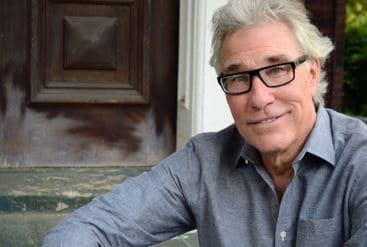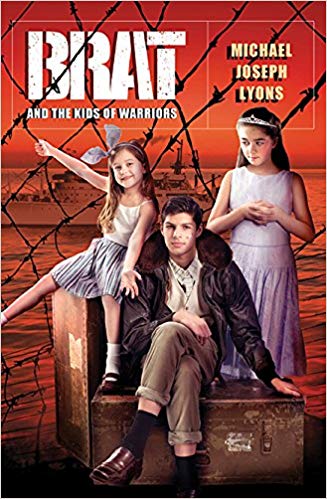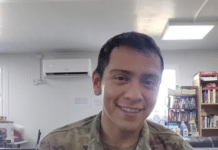ELMHURST, Illinois – Debuting a new book series for tweens and teens, author and U.S. Army veteran Michael Joseph Lyons is borrowing scenes from his own military family upbringing to craft the adventurous escapades of the McMasters children in “BRAT and the Kids of Warriors” available now on Amazon.com.
The book follows Jack, Queenie and Rabbit McMasters who have been raised on World War II stories told by their father and other military officers who fought on the front lines overseas.
Now the tight-knit trio is traveling from the United States to post-WWII Germany, facing an enemy their parents won’t name. But as their father fights this unnamed threat, the siblings face their own battles––forming an alliance of BRATS against the bullies, relentless in their harassment of the perpetual new kids.
“BRAT and the Kids of Warriors” is the first book in a historical fiction series that Lyons hopes will serve as a window into the unique lifestyle of kids growing up in a military family, tightly bound by strict discipline while also enjoying enormous freedom.
“Readers love the adventurous lives of Jack, Queenie and Rabbit, but through them we also see how military brats develop that greatest of life skills—grit,” Lyons says. “This is just one adventure story taking place in 1957, but it is representative of how the more than 17 million brats alive today were raised as the children of our U.S. Military. There are 1.6 million brats on active duty at this very moment. This new generation of military kids, given the unique culture they are growing up in, are acquiring the exact skill set that will help them be successful in tomorrow’s world.”
Michael Joseph Lyons is a brat—and he admits that with great pride. He lived the adventure of growing up in a military family. His dad was a U.S. Army colonel; his mom was the general in charge of their family. Lyons moved nine times and attended 11 different schools, more overseas than in the United States.
He went on to join the U. S. Army, initially as a lieutenant and then a captain. Later, he developed and taught a courses at UCLA on the nine principles of war and became a serial tech entrepreneur. Today Lyons and his wife and two dogs live in the Chicago area, frequently visited by their seven children and their families.
About the Book
“BRAT and the Kids of Warriors”
- Michael Joseph Lyons | Nov. 1, 2018 | Bravur Media LLC
- Hardcover 978-1946957023 | $22.95
- Ebook | $9.99
Adventure, spies, violence, and serious ingenuity abound in this fascinating story of Army brat Jack McMasters and his sisters. The author is a master at bringing to life the unique lifestyle of kids growing up in a military family overseas, tightly bound by strict discipline and enjoying great freedom. Any infraction reflects upon, and can adversely affect their parents’ careers, but none of that limits these kids, whose fathers fought in World War II and are now back in Germany facing an enemy that all the parents are determined to keep secret from the children. When attacked by a bully and his thugs on his first day at yet another new school, Jack quickly teams up with other brats to figure out a way to overcome their common adversaries. Always ready to explore and invade their enemies’ territory, the brats pursue one adventure after another, building toward a grand quest in answer to a challenge issued by a disgruntled teacher.
Those who are not familiar with the military lifestyle may wonder at the ease with which Jack and his sisters make both friends and enemies at school, where they are, once again, the new kids. Through encounters and conversations, the reader hears tales of heroism and blunder, learns little-known facts about the times during which the story takes place, and meets people of a foreign land; one that only recently tried to destroy their parents and their way of life.
“BRAT and the Kids of Warriors” is an excellent, spell-binding read for young adults, as well as adults. An intriguing cliff-hanger at the end makes me eager to read the next book in what promises to be a wonderful series.
 An Interview with MICHAEL JOSEPH LYONS
An Interview with MICHAEL JOSEPH LYONS
You have lived all over the country and world––did you ever develop or feel a sense of “home” in any of the locations you’ve lived? Where?
One thing all military brats have in common is that sense of having no hometown. We are from everywhere, and at the same time from nowhere. When we are asked where we are from, some of us just say, “I’m from the United States Military.”
For me personally, I find it interesting that each time I go back to Europe it seems more like returning to the place of my childhood, than any specific place in the United States. Orleans, France, right in the heart of the Loire Valley is probably the place I relate most to. I spent four years attending a French boys’ school, while our family was stationed there. At that time I morphed from an Army brat into a French kid. We brats have always been massively adaptive, and great chameleons. But that’s a story for another day. In fact it may take until book four in the series before Jack McMasters has a fictional experience similar to that.
You not only grew up as a military brat, but you also served in the U.S. Army. Were there components of your childhood that you didn’t understand until you, yourself, enlisted and served?
It was a privilege to serve this country as a United States Army officer. But I also believe it is fair to say that the kids of the military also serve this country. Every brat quickly learns that it is the United States military who is at the top of the pecking order determining what happens in their lives. Almost from birth military brats are taught that, wherever they go, and whatever they do, they represent this country, and that all their actions need to reflect what is best about America. But in the case of brats, they did not volunteer, they were born into service. I didn’t really understand the distinction until I was an adult serving on active duty.
How much of Jack’s character is based on your own childhood experiences?
Without a doubt the story is fictional. However, as a writer we don’t write out of nothingness—at least I don’t. The story takes place in 1957 at the height of the Cold War. If there was a hot-spot anywhere in the world it was Germany. If World War III were going to break out, that is where it would happen. We had 3,000 Russian tanks, up on the Iron Curtain, pointed directly at us. Germany had the greatest concentration of military forces anywhere in the world, and it was a hotbed of foreign spies. That is where I was in ‘57, and my father was a Lieutenant Colonel stationed with 4th Armored Division. This is the setting for the story. Jack McMasters and his sisters live on an Army post called Cooke Barracks—that military post really existed and was the Headquarters 4th Armored Division. That is where I lived.
The story is historical fiction, and I have worked very hard to assure the setting, the history, the military, and brat life are accurate. I even went so far as to assure slang terms used in the story are period correct.
But…the adventures, the fights, the spy, and all the brat antics…surely they must be fictional.
Jack soaks up war stories he overhears from his father––did you also grow up hearing war stories? Can you tell us about one of the most memorable stories you heard growing up?
I did grow up on war stories similar to those depicted in the book. However, I think it is important to point out that none of those stories were about blood and guts, and the horrors of war. The ones I grew up on, like those depicted in the book, were more about successful or unsuccessful military strategy and tactics. They were great stories about how wars or battles are won or lost. Many of them are humorous stories, but always with solid military lessons and life lessons underlying them.
Like in the story, my mother was and still is a fabulous cook, and a grand master of the dinner party. Through out my brat-hood military officers would find their way to her dinner table, and it was there that such stories were told. It was at that table that I learned a great deal about the art of war.
One of my favorites was told at that dinner table by a French military officer. It was about General Washington (the guy who never told a lie…“I chopped down the cherry tree.”). The story is about how Washington and the Continental Army had the British surrounded in Boston during the Revolutionary War. However, he could not attack because he had no gunpowder. The story is about how Washington had to fake out both the British and his own men, saying he had a secret stash of gunpowder, and never letting on that there really was no gunpowder, until months later when he finally managed to get some. Now I am not saying General Washington lied, but… It is one of the stories I use in the book.
Do you think that the brat culture you experienced growing up still exists? Or has this changed as the way we fight wars has changed?
In most respects brat culture has remained the same, which is why a story that takes place in 1957 can be totally relevant today. Still today, military personnel are transferred every two or three years, if not more often, and thus military brats are constantly moving somewhere new. And I am not talking about moving to a new house across town, I am talking about moving halfway across the country if not the world. Still today brats have to leave every friend they have and everything they know each time they move. Today’s brats know what it is like to be “the new kid” walking into a new class room halfway through the school year, when everyone already knows everyone.
The two biggest changes are that some of today’s brats have it even harder than we did, because their military parents have been deployed to war zones four and five times for a year or more at a time. That means they may have spent half their childhood not seeing that parent, and not knowing if they are ok. We had that same thing, but in my case it only happened twice, where I did not see my father for a year at a time.
How much did always being the “new kid” shape your identity, not only as a young school kid but also as an adult? Did it impact how you parent your seven children?
It had a huge impact on me. I hated it, but it gave me grit. It taught me that what was important was to adapt to others’ languages, dialects, and cultures—and do it quickly. It taught me to be a chameleon. It forced me to become gritty. As such I was much more likely to persevere when others failed. I truly learned to believe that failure is not a permanent condition. Sometimes I walked into a new class room as the new kid and it all went well, and other times it was a disaster. I learned way more from the disasters. I learned not to moan and miss my last great duty station, but rather to make sure no matter how hard it was, how bad the place seemed, to make this new place into something good—even if it took a really long time.
It also taught you to size up people fast and make friends quickly. And it seriously taught you to value diversity. If you were only able to make friends with people just like you—well, good luck with that. You weren’t going to be there long, so you had to make the most out of the time you had, and those who were there—whoever they were. Brats are the most color-blind, culture-blind, privilege-blind, status-blind kids I know. Brats simply don’t have an option to be otherwise—there just isn’t enough time. And so, we become the massive beneficiary of knowing and befriending a huge diversity of people.
As for my kids they think that I am a seriously different parent. I am not. They just don’t know it, because they weren’t raised as brats. There are about 17 million kind of like me—all those other brats.
But my kids would be happy to cite you chapter and verse:
- Stand up straight and put your shoulders back.
- When you meet someone for the first time, look then right in the eye, never breaking eye contact, and give then a firm handshake.
- Read, and never stop reading.
- Education is not optional—and it never, ever ends.
- Never be around people who don’t believe in you.
- Never leave anyone behind—especially at Thanksgiving or other holidays. If they don’t have somewhere to go, you bring them to our table.
- You represent the United States of America. Make sure you represent the very best of who we are.
- Don’t litter. And pick up two pieces of litter every day. You are directly responsible for making this planet a better place.
- etc. etc. (Our seven kids probably have a list a mile long.
We have to ask: tell us about your two pups! Are they your writing sidekicks? Were you able to have dogs in country-hopping childhood?
We have a marshmallow pretending to be a golden retriever, and a mute who is definitely in charge. Growing up a brat I had two dogs; the first was Sandy the Smart, the smartest dog who ever lived, and later we had Duke the Dumb, the dumbest dog who ever lived. And much as we loved them, when it came time to move—one more time, we were required to leave them behind, just as we did all our friends.
Resources
All content herein is owned by author exclusively. Expressed opinions are NOT necessarily the views of VNR, authors, affiliates, advertisers, sponsors, partners, technicians, or VT Network. Some content may be satirical in nature.
All images within are full responsibility of the author and NOT VNR.
Read Full Policy Notice - Comment Policy






























